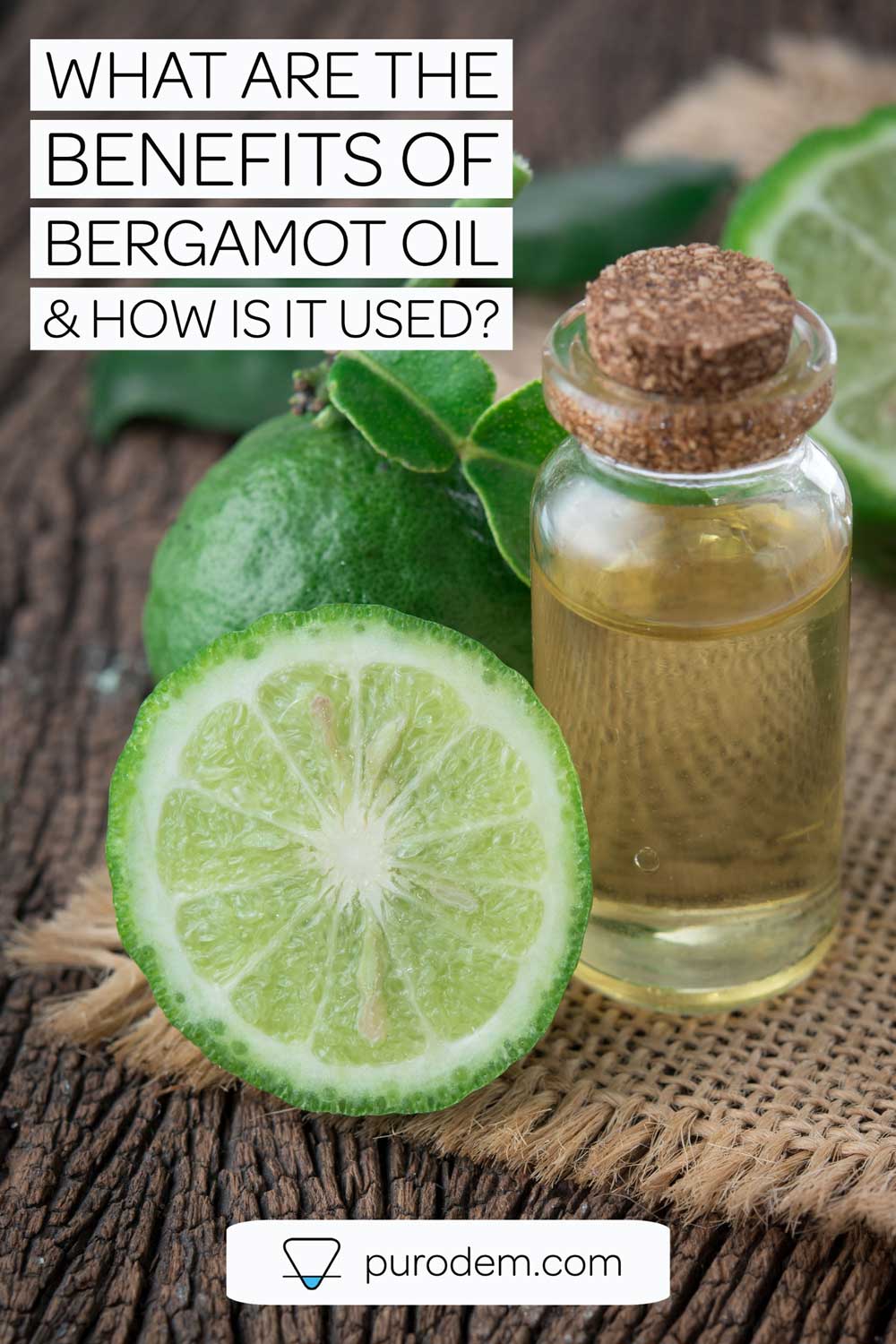Bergamot essential oil (bergamot citrus bergamia) is one of the most popular essential oils used today due to its effectiveness and wide use of applications in aromatherapy and skincare products, from relieving stress to reducing acne symptoms.
It is a fragrant citrus fruit used for centuries in aromatherapy because of its refreshing and stimulating scent. Still, Bergamot oil can also help to relieve troubled skin conditions when used as an ingredient in natural skincare products.
In this article, we will discuss how Bergamot oil can help with your aromatherapeutic and skincare needs, some of the most common uses for bergamot oil and how they can benefit your skin and mood!

Where Does Bergamot Essential Oil Come From?
Bergamot oil (INCI: Citrus aurantium var. bergamia) is extracted from the fruit of the Bergamot tree, which belongs to the Rutaceae (also known as Citrus) family. It is grown predominately in the Reggio di Calabria province of Italy, with small numbers elsewhere in other warm regions like Algeria, Morocco and Tunisia.
The Bergamot tree is a flowering plant that can grow up to 15 feet tall with strong branches that produce abundant fruits during its growing season. The fruit is green but can turn colour to yellowish/orange skin when fully ripened.
How Is Bergamot Essential Oil Produced?
There are two different types of Bergamot Oil available:
Bergamot Oil Expressed
Bergamot essential oil (expressed) is produced by cold-pressing the rinds of bergamot oranges. The fruit is harvested when it reaches maturity and then cold-pressed by heavy steel plates in an industrial press at a low temperature to release and preserve the quality of the extracted fragrant bergamot oil.
Bergamot Oil FCF / Bergapten Free
The chemical compound in bergamot essential oil (bergapten) can be toxic to the skin if applied topically and then exposed to UV sunlight. An alternative production method of steam distillation is used to remove these phototoxic compounds so that Bergamot essential oil FCF (Furocoumarin-free) can be more safely used in topical applications or blended with a suitable carrier oil such as coconut oil to be applied directly to the skin.

What Does Bergamot Essential oil Smell Like?
The bergamot oil plant is a member of the citrus fruit family, and its essential oil is extracted from the peel. As you would expect from citrus fruit, the scent is a bright, uplifting, refreshing aroma with a green note, making it less sweet than Clementine or Orange essential oil.
It is used often in aromatherapy and is regularly used as a perfume in cosmetic personal care products.
Does Bergamot Smell Like Earl Grey Tea?
It sure does! Bergamot is also responsible for giving Earl Grey tea its distinctive flavour. In 1824, Earl Grey tea is believed to have been created when Bergamot was used to enhance the taste of low-quality tea.
What Are The Benefits of Bergamot Oil?
Bergamot oil has been used for centuries in aromatherapy because of its refreshing and enticing aroma. The scent is refreshing and helps promote a sense of inner calm that may help relieve stress or tension.
The oil can also be used to help promote healthy skin, and its antiseptic and antibacterial properties make it an ideal oil to help acne-prone skin especially when blended and applied topically; it’s thought that Bergamot oils antimicrobial, antiseptic and deodorising qualities make it an effective ingredient in body care products to help relieve other problems like athletes foot and sweaty feet that can be both sore and irritating.
What Is Bergamot Essential Oil Used For?
Anxiety & Stress Relief
The Bergamot scent is a distinctive fragrance used in aromatherapy for centuries to provide uplifting benefits. For some, it can help with emotional stressors and headaches when inhaled directly from a tissue or smelling strip or diffused into the air as an aromatic therapy treatment.
It is highly effective in helping to relieve feelings of stress and anxiety and balancing energy levels, as bergamot has been shown to have a calming effect on the mind.
Aromatherapists often use bergamot aromatherapy oil in massage therapy for its analgesic and antispasmodic properties when trying to help ease muscular pain or muscle cramps by adding a few drops of Bergamot oil to a carrier oil such as jojoba oil to create a uplifting yet deeply relaxing massage oil.
Bergamot essential oil is often used in aromatherapy diffusers due to its popular soothing scent that helps you relax and relieves feelings of anxiety when inhaled. It can be used on its own or with other oils as an aromatic blend by mixing a few drops of bergamot with other essential oils such as Lavender oil, Ho Wood oil, Rose or Chamomile.
You can also use bergamot essential oil for its rebalancing relaxing properties by adding it to a dispersant and then mixing it with your bath water to help with sleep health rituals. Bergamot can also be used as a natural insect repellent for those sensitive or allergic to harsh chemical insecticides who want an effective, all-natural alternative.
(Read more about The Power of Aromatherapy for Restful Sleep)
As well as being used in aromatherapy, Bergamot oil is an excellent ingredient of choice when used in cosmetic formulation. Its bright, green, citrus scent adds an uplifting aroma to products, while the natural therapeutic properties of bergamot make it a real asset for skin health benefits.
Acne
Bergamot oil is an effective natural remedy for many skin problems, making it an excellent choice for skincare formulations, especially those that target teenage acne, as it can help reduce the bacteria on the skin by fighting against skin inflammation and breakouts with its antimicrobial benefits.
Bergamot oil also has astringent properties, which help to tighten pores and reduce excess sebum production, making bergamot a perfect ingredient for those with oily skin.
It has been shown that Bergamot, especially when blended with other essential oils such as Lavender and Chamomile, may help to calm the appearance of redness and inflammation associated with many skin problems such as eczema, some types of dermatitis or psoriasis due to its antibacterial and anti-inflammatory properties.
This makes Bergamot an ingredient of consideration when formulating any natural skincare product to help balance troubled skin.
Other uses of Bergamot
Fragrance & Perfume
Bergamot essential oil is a key ingredient in the original Eau de Cologne created at the beginning of the 18th century. It is still widely used as a key ingredient in the perfumery industry, with many popular perfume houses still creating Bergamot-based fragrances and colognes.
It is also a popular choice to be included in general off-the-shelf cosmetic skin and hair care formulations to give that pleasant, not-too-sweet, bergamot-orange fragrance.
Bergamot Hydrosol
Bergamot hydrosol is a byproduct of the steam distillation process. Essential oils in the bergamot orange’s rind are carried within the water vapour condensation chamber. The essential oils are then removed from the water, leaving a distillate known as Bergamot Hydrosol, used in various aromatherapy applications such as prescription cream emulsions or a facial toner/mist.

Tips On Using Bergamot Essential Oil
- As with all essential oils, Bergamot oil is heat sensitive, so when adding to your skincare formulations, remember to add it to the cooling stage (below 40C) when making your product.
- Many people find Bergamot aroma refreshing, while others may find it too penetrating or reminiscent of commercial eau de cologne. If you are one of those in need of the benefits of Bergamot but would prefer a milder citrus scent, try adding other essential oils to your diffuser blends, such as Orange, Red Mandarin or Lavender, to create a softer or more herbaceous fragrance profile.
- Bergamot blends well with other citrus oils, such as Lime or Lemon essential oil. It also goes well with grounding scents like Patchouli or Vetivert, giving these sometimes lingering oils a lighter edge.
- For an uplifting, refreshing aroma, blend Bergamot with essential oils such as Yuzu, Petitgrain and Neroli.
- It also mixes well with Lavender and Frankincense to create an aromatherapy blend to help those feeling anxious.
General Safety Information When Using Bergamot Essential Oil
Some side effects may occur from using Bergamot oil, so some care should be taken.
- Plant essential oil is highly concentrated; it should be used sparingly, in small quantities, and mixed with another ingredient, such as a carrier oil, to make the blend less intense. Although some multi-layered retailers will apply essential oils directly onto the skin, as aromatherapists, we advise diluting it with a carrier oil or lotion/ointment for topical use.
- Bergamot essential oil contains Bergapten (Furocoumarin), which can cause irritation to the skin when exposed to direct sunlight. Make sure to choose bergapten / FCF (Furocoumarin-free) oil, which can then be blended with a suitable carrier oil or into your cream formulation for any topical application.
- A small patch test is recommended before use on sensitive areas of the body such as your face. Avoid use around the eye area.
- As with other essential oils, if you are pregnant, epileptic, or have any other medical condition, you should consult a qualified aromatherapist before using any essential oils.
- The International Fragrance Association (IFRA) limits bergamot essential oil usage because of its potential to cause phototoxic reactions. In particular, IFRA advises that products applied and left on the skin should contain no more than 0.4% bergamot oil. This limitation is stricter than for any other essential oil derived from Citrus.
- To avoid doubt, we recommend not taking essential oils orally.
Final Thoughts
Bergamot essential oil is an intriguing, light, refreshing citrus scent that blends well with many other oils used in aromatherapy. It also has many skin benefits for those who want to use bergamot as a cosmetic ingredient in their skincare formulations. Bergamot essential oil may help soothe and balance sensitive skin easily irritated or prone to conditions such as acne, eczema or psoriasis.
As with all aromatherapy oils, it is always better to seek professional advice from a qualified practitioner should you be unsure how to safely use these oils, whether in an aromatherapy or cosmetic skincare formulation.
So, what will you do with your new knowledge of Bergamot essential oil? Will you be using it when formulating your own cosmetic formulas? Will you add it to your next aromatherapy treatment?
Let us know! We can help by giving you more information on incorporating these into your formulations or if you need guidance.






